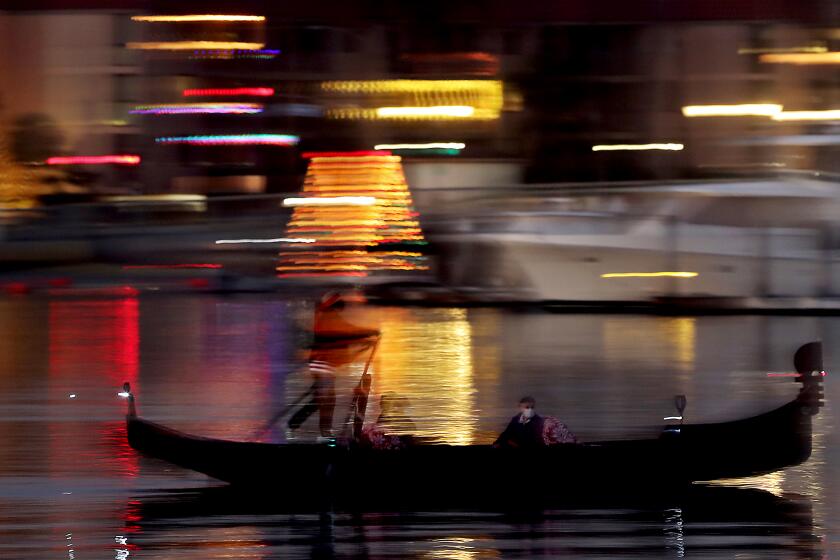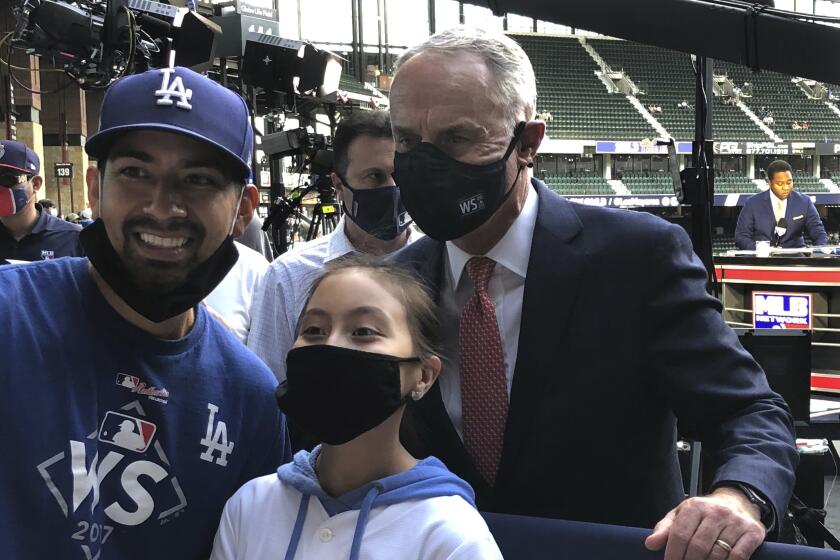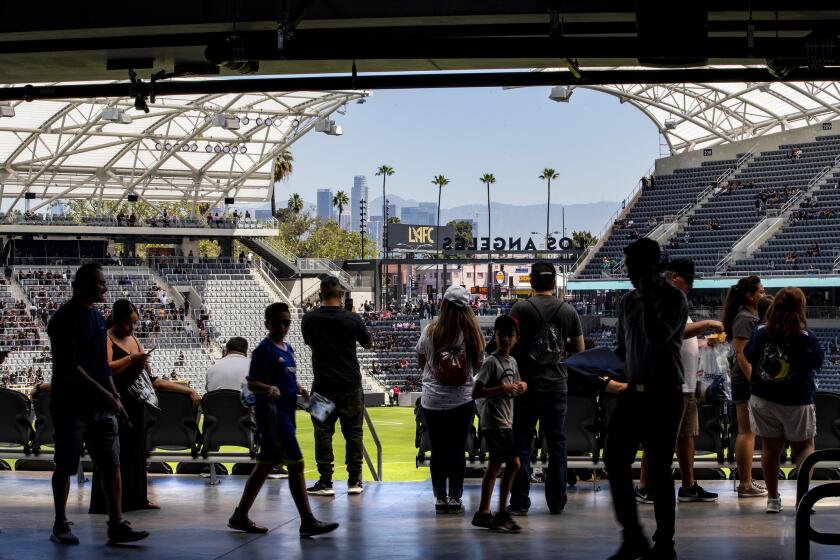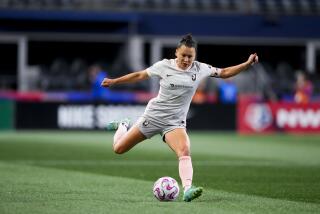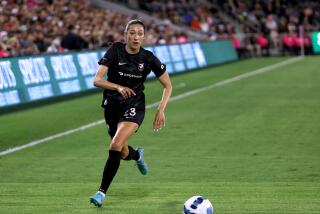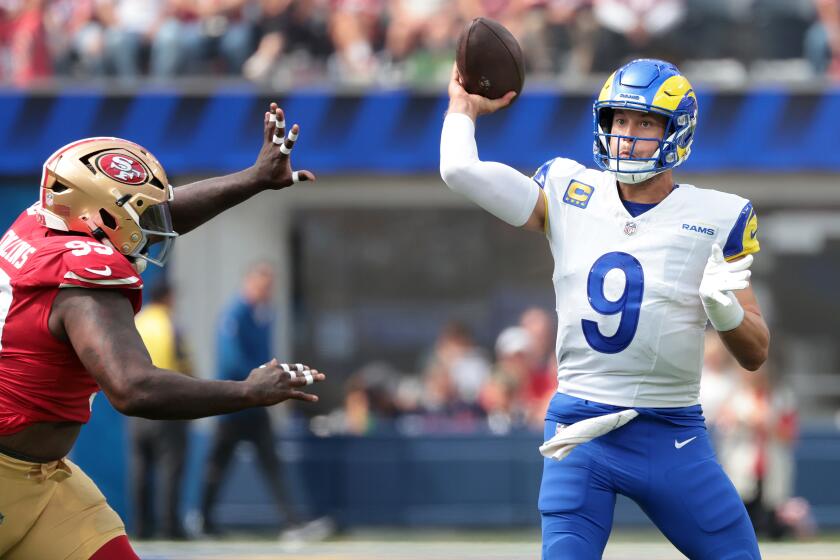How Rachel Buehler Van Hollebeke went from the USWNT to the front lines of COVID-19
- Share via
During a playing career that took her to the top of two Olympics medal stands and a Women’s World Cup final, Rachel Buehler Van Hollebeke was known for two things: A hard-nosed playing style that earned her the nickname “The Buehldozer” and … the backpack.
“She always carried around this backpack, and it was filled with the ‘what ifs,’” said Christie Pearce, who played alongside Van Hollebeke on the national team. “If somebody needed a tissue or an extra shin guard, her bag was like [an] endless pit.
“She was always prepared and ready for anything.”
Gov. Gavin Newsom has announced a stay-at-home order affecting most of California.
She still is. And those two defining traits — her competitiveness and caring — are proving valuable in Van Hollebeke’s post-playing career as a doctor in residence at Scripps Mercy Hospital and at the San Ysidro Health Centers in Chula Vista, a hot spot in the COVID-19 pandemic.
“COVID’s everywhere and it affects everybody,” Van Hollebeke said. “It’s crazy. It’s not like anything you typically see. It is a scary disease.
“I don’t want to be a fear[ful] person. But it can be so dangerous in certain ways.”
Major League Baseball is quietly reaching out to fans to learn what would make them feel safe at the ballpark amid the coronavirus outbreak.
Marta on a breakaway or Christine Sinclair setting up for a corner kick was dangerous, too, but fail against either of those iconic players and the worst that can happen is you give up a goal.
The stakes with COVID are much higher.
“I have seen people die,” said Van Hollebeke, who, as a family medicine resident, treats infected patients but is not regularly on the COVID front lines. “I haven’t seen the flu kill people like this. It’s much, much worse.”
Van Hollebeke arrived at Scripps Mercy shortly before COVID did, graduating medical school at UC San Diego last year and beginning her residency about five months before the virus was emerging in Wuhan, China.
Soccer had a lot to do with that timing.
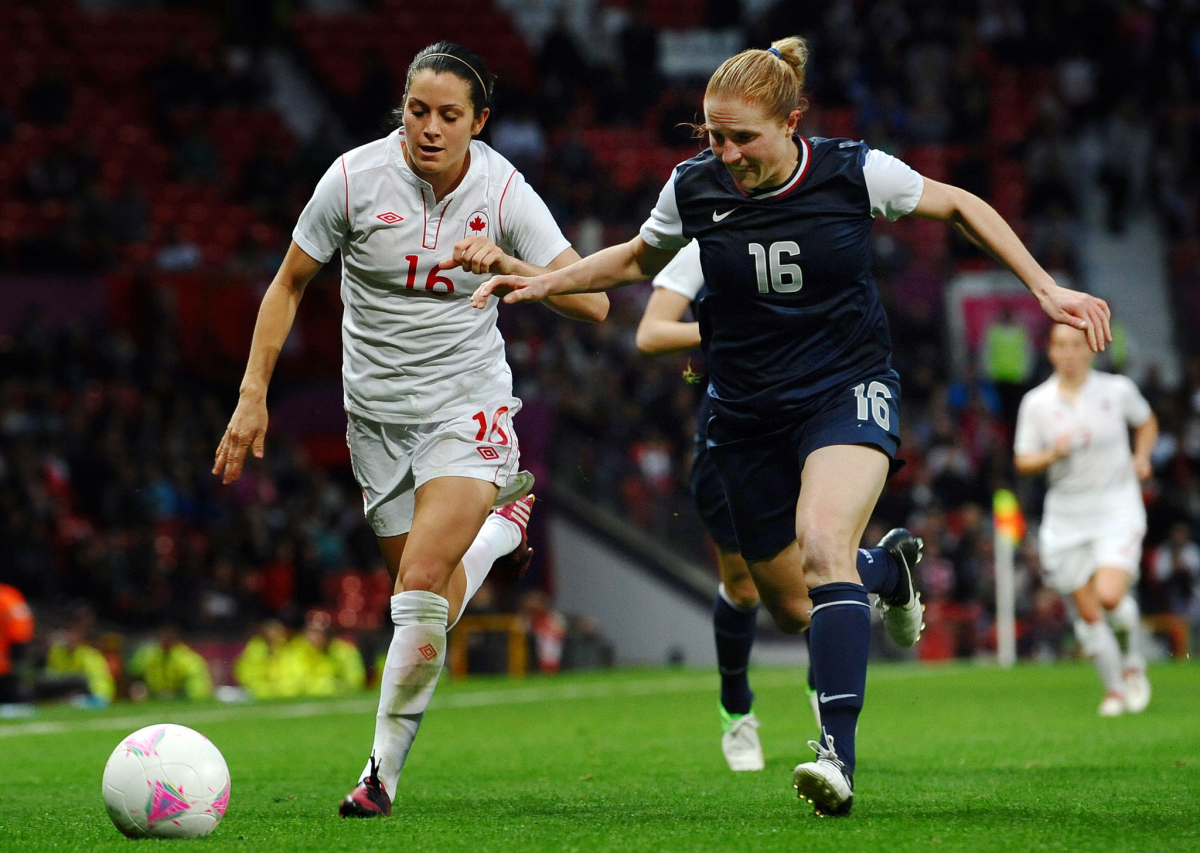
After making 98 international appearances and winning two gold medals in her first five years with the national team, a series of nagging injuries limited Van Hollebeke to 10 starts over the next three years. When she was left off the team for the 2015 World Cup, Van Hollebeke announced her retirement on the day before her 30th birthday.
Entering medical school after soccer was over had always been the plan. Medicine has long been the family business.
Van Hollebeke’s father was a cardiothoracic surgeon for four decades and her grandfather and great-grandfather were general practitioners. Younger sister Anna, who completed her medical studies at UC San Diego earlier this year, started her residency in internal medicine at the University of Colorado four months ago.
“There’s something special about directly helping people every single day”
— Rachel Buehler Van Hollebeke
Growing up outside San Diego, Van Hollebeke tried volleyball, tennis, dance, even karate, but she thrived at soccer, which allowed her to follow in the footsteps of her father, Donald Buehler, to Stanford. As a pre-med student, Van Hollebeke majored in human biology while captaining the women’s soccer team for three seasons and earning multiple academic All-America awards.
But even on national team trips, she never strayed far from her medical books.
“She was studying for the MCAT,” said Pearce, who played most of her career under her married name, Rampone. “I always remember her having her note cards, because she knew when the time was up with soccer she was transitioning and she wanted to be ready.”
As a resident, Van Hollebeke works long hours in multiple departments at Scripps Mercy, which serves a working-class, mostly Latino area less than 10 miles from the Mexican border.
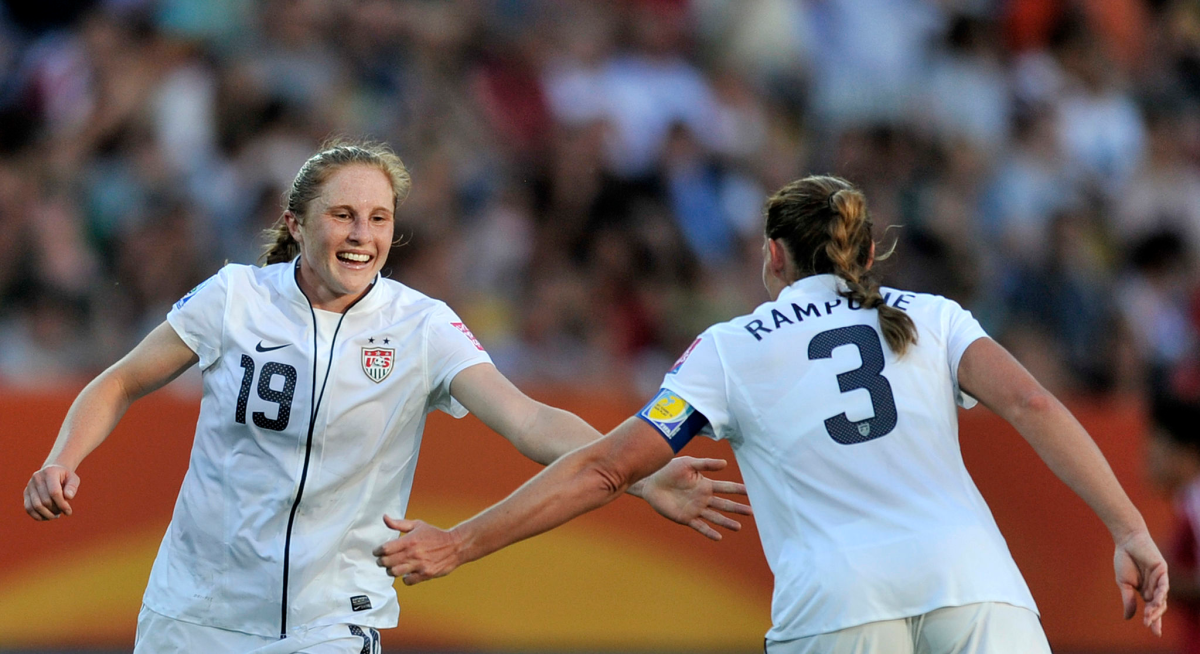
“She’s highly skilled under pressure. In critical moments that was her specialty.”
— Christie Pearce, Rachel Buehler Van Hollebeke’s former USWNT teammate
“They talk about COVID affecting more underserved communities and Latino communities. I was experiencing that,” she said. “It’s very, very real down here. We saw it in the first wave and we’ve been seeing it the whole time.”
Pearce had a brush with the virus when her eldest daughter Riley‘s high school soccer season was interrupted after a teammate tested positive, prompting everyone to quarantine at home for two weeks.
“It’s a life-changing disease,” said Pearce, who co-authored the book “All In — Raising Kids for Success in Sports & Life,” about helping youth athletes through challenging events. “Be a good teammate. Wear your mask, do the right protocol whether you believe in it or not.
“It’s not about you, it’s about everybody else. That’s what Rachel is all about. She’s all about everybody else and making those around her better and stronger.”
Angel City has a home after reaching an agreement to share Banc of California Stadium with LAFC.
Pearce, who played alongside Van Hollebeke in the middle of the U.S. defense, said there were things at which her teammate excelled, like communication and quick thinking, that translate from the playing field to the ICU ward.
“She’s highly skilled under pressure,” Pearce said. “In critical moments that was her specialty. She was brilliant. Not overthinking anything and just believing in what her instincts told her.”
Those instincts are now telling Van Hollebeke to take extra precaution as COVID cases spike to unseen levels. The Centers for Disease Control and Prevention said earlier this month that more than 200,000 health care professionals had contracted COVID and more than 1,330 had died from the virus. But those numbers, the CDC said, are almost certainly a vast undercount. The real numbers could be three times as high.
Most days she doesn’t change out of her medical scrubs, never goes anywhere without a face mask, rarely eats indoors and, outside of work, limits interactions to close relatives. Her family — husband Bobby and 2 1/2-year-old daughter Leona — follow the same rules.
Even though she changes clothes before leaving the hospital, she showers and changes again as soon as she gets home, stepping around Leona and heading straight to the bathroom.
“She can’t even hug me when I come home. I’m like, ‘No, don’t touch me,’” Van Hollebeke said. “She knows the routine now.”
Van Hollebeke still hasn’t given up soccer entirely. Planning for a happier time when COVID is in the rearview mirror, she is among 14 former national team players who joined the majority female ownership group of Angel City, an NWSL expansion franchise that is scheduled to begin play in 2022.
“I’ve been so focused on medicine since I retired. But soccer was and still is such a huge part of my life,” Van Hollebeke said. “It’s fun to honor that again and get involved and be part of something that’s really cool and pushing the women’s sport forward.
“Both careers are incredibly fulfilling.”
She was invited to join Julie Foudy, a two-time World Cup winner who urged players with a Southern California background and national team pedigree to support the fledgling team.
“We felt it was important as players that we give back to the game and that we invest in the game and that we’re part of it,” said Foudy, who retired four years before Van Hollebeke made her international debut. “There should be players on every ownership group in terms of just being able to provide a perspective that a lot of owners don’t have.
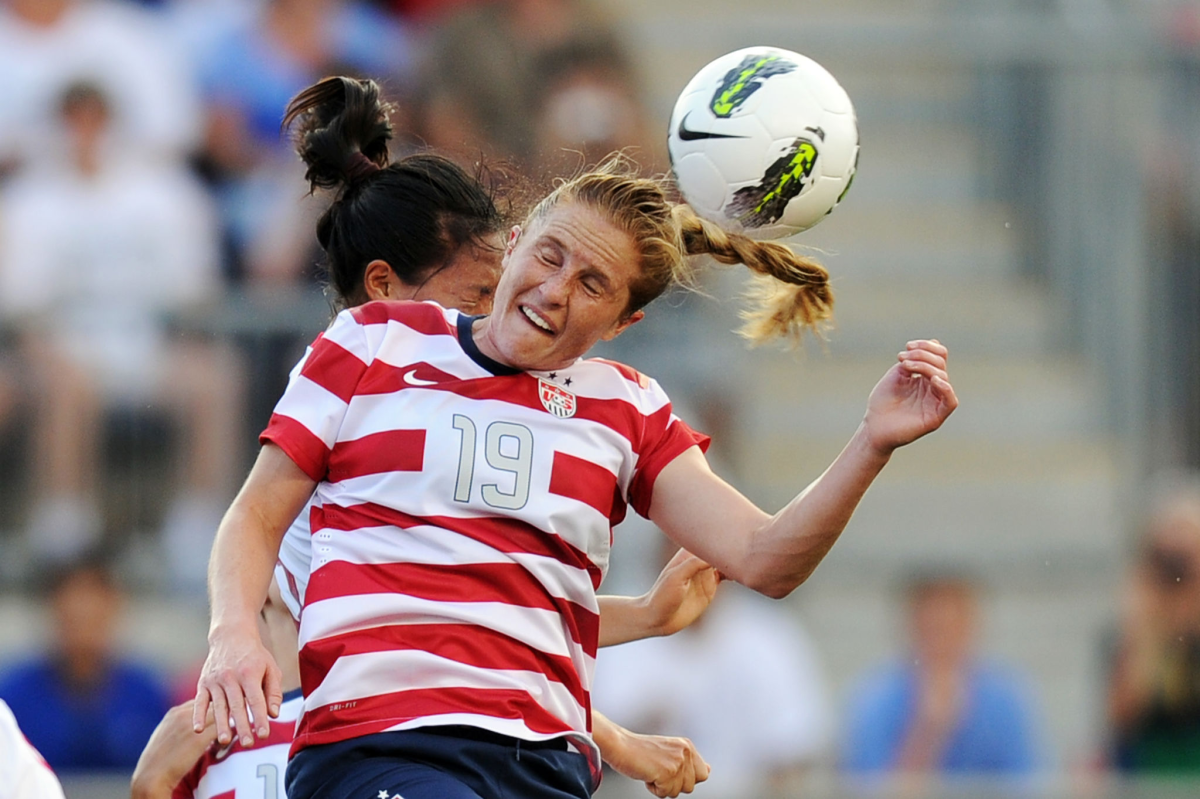
“Hopefully it’s a playbook for not just soccer but for other sports as well on the women’s side.”
Angel City’s first scheduled game is still 18 months away. By then, Van Hollebeke is hopeful the COVID nightmare will be over and her workdays will consist of delivering babies, patching up cuts and broken bones and hugging her daughter before taking a shower.
“There’s something special about directly helping people every single day,” she said. “When I’m taking care of patients you think, ‘Oh my gosh, if that was my dad’ or ‘If I was his daughter,’ whatever.
“I’ve seen people die. That’s very sad.”
More to Read
Go beyond the scoreboard
Get the latest on L.A.'s teams in the daily Sports Report newsletter.
You may occasionally receive promotional content from the Los Angeles Times.

